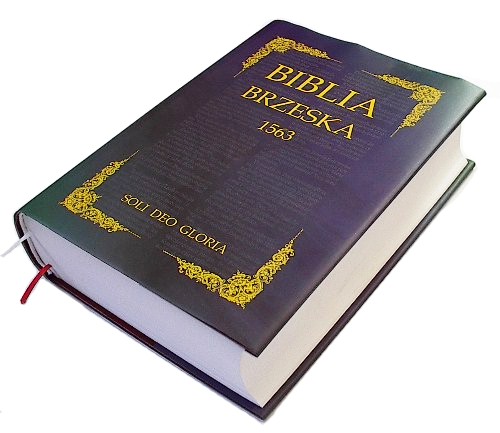|
The Brest Bible of 1563 (also known as Radziwillowska Bible) is one of the superb testimonials of Polish culture. It came out of the 16th century soil of religious movements as a Polish Calvinistic translation of the Holy Scriptures. It is the first translation into Polish of the Bible from its original languages - Hebrew and Greek. The Brest Bible was brought together at Pinczów, the main center of the Reformation in Poland during 16th century, by a group of excellent theologians including Gregory Orszak, John a Lasco, Francis Stankar, Peter Statorius, Andrew Trzecieski, Jakub Lubelczyk and Martin Krowicki.
The print of the Bible at Brest was paid for by Nicolas Radziwill the Black. There were other translations of the whole Bible in the next few decades, including the so-called Budny's Bible (Nieswieska, 1572, Anti-Trinitarian) and Wujek's Bible (Kraków, 1599, Roman Catholic). These demonstrate the extensive intellectual and religious life of that period. In addition to an obvious important confessional value to Polish Calvinists, the Brest Bible is an outstanding example of the greatness and diversity of Polish culture during the Renaissance, as well as an illustration of remarkable beauty of the Polish language of that period. Admittedly, the Brest Bible is distinguished as being the most perfect linguistically, and is written in artistically impeccable Polish with a great level of accuracy considering the diverse parlance of Biblical books. The significance of the Brest Bible to Polish culture is unquestionable and its lofty lingual level of artistic quality is confirmed contemporarily (even by Jakub Wujek), spanning to 20th century study by professor Ewa Ostrowska ("'Psalterz' Kochanowskiego a 'Psalterz' z Biblii Brzeskiej"). This edition has been prepared in modern spelling by our joint effort. It reintroduces the Brest Bible to present day Calvinistic circles. This edition also introduces the Brest Bible to the enlightenment of Polish spiritual and intellectual life for the 21st century. |

|